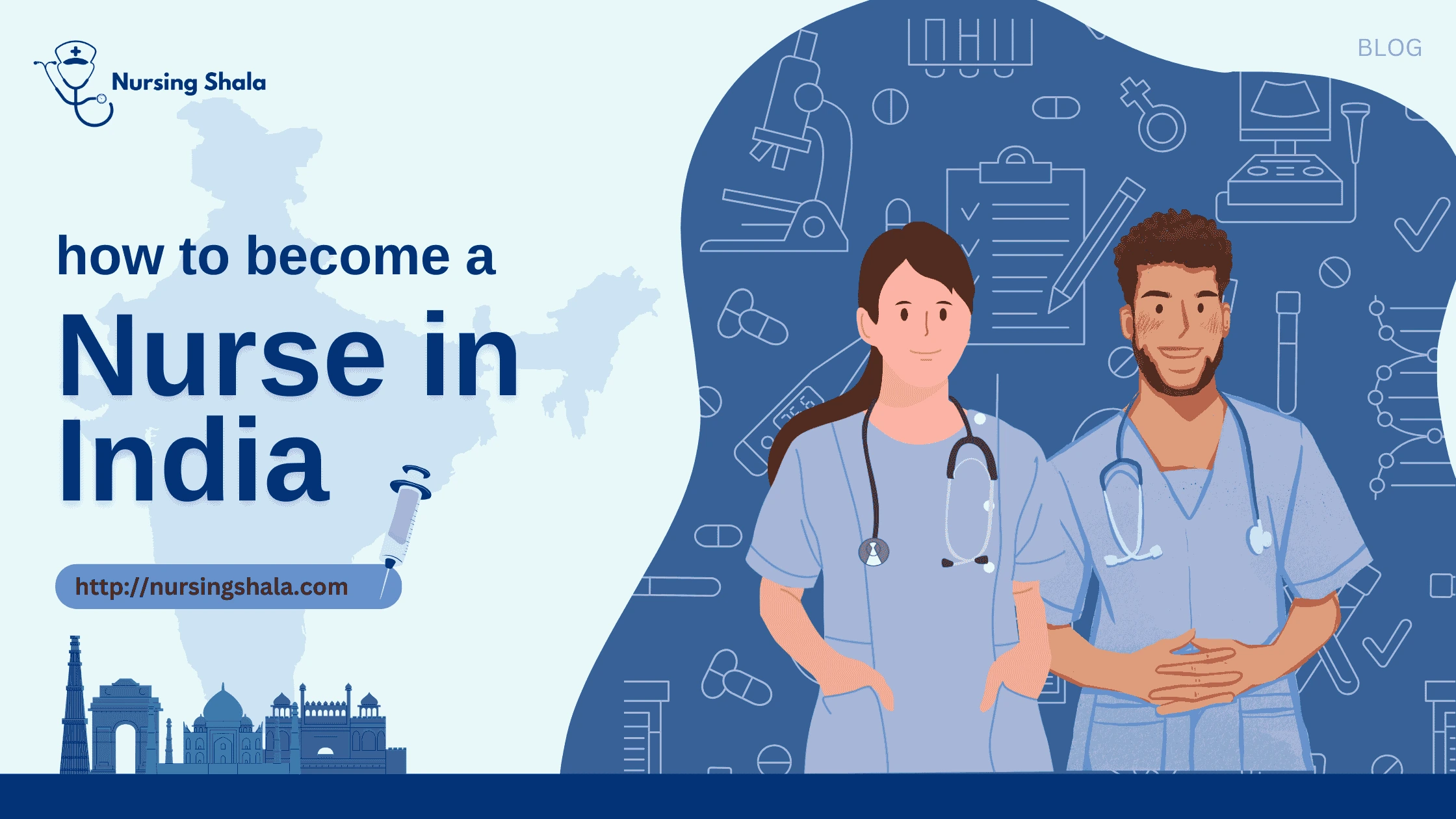If you are wondering how to become a nurse, you’ve come to the right place. Many people search for information on how to become a nurse, especially as nursing remains a high demand profession. Choosing a career often depends on the availability of flexible opportunities. In this context, the healthcare industry offers numerous options and opportunities for individuals who want to prioritize society’s needs. You take on multifaceted responsibilities once you decide to pursue a healthcare career. Ensuring optimal care for human life is daunting, but it brings joy and purpose to those who pursue it.
Nursing carries significant societal responsibility, requiring the delivery of top-tier patient care, regardless of the circumstances. Understanding how to become a nurse means more than just knowing the course to take; it involves a deep dive into the specializations, the responsibilities you’ll undertake, and the personal qualities required to thrive in this field.
Whether you are just starting out or considering a career change, knowing how to become a nurse can open up a world of opportunities in healthcare. If you have a clear understanding of the process of becoming a registered nurse in India and unwavering confidence in your decision, nothing can impede your path to a successful nursing career in India. Here is a comprehensive step-by-step guide on how to become a nurse in India.
Table of Contents
ToggleWho is a Nurse?
According to the International Council of Nurses, a Nurse is a person who has completed a program of basic, generalized nursing education and is authorized by the appropriate regulatory authority to practice nursing in his/her country. This individual must be prepared and licensed; to practice the general scope of nursing which includes the promotion of health, prevention of illness, and care of physically ill, mentally ill, and disabled of all ages in all settings; to carry out health care teaching; to actively participate in the health care team; and to be involved in research.
(ICN, 1987)
A nurse is a trained and licensed healthcare professional who takes care of sick people in collaboration with another healthcare professional.
Nurses are proficient in numerous specialized fields, each demanding different levels of certifications and accountability. They play a pivotal role within various healthcare settings such as hospitals, doctor’s offices, and long-term care facilities. Their scope of practice and daily responsibilities and duties are diverse and can significantly differ based on their educational background, training, and specialized areas of expertise.
While a significant number of nurses are involved in direct patient care, others are engaged in roles like research, education, counseling, advocacy, and policy development, contributing to the advancement of healthcare beyond clinical settings.
What is Nursing?
According to the International Council of Nurses, Nursing encompasses autonomous and collaborative care of individuals of all ages, families, groups, and communities, sick or well, and in all settings. Nursing includes the promotion of health, prevention of illness, and the care of ill, disabled, and dying people. Advocacy, promotion of a safe environment, research, participation in shaping health policy and in patient and health systems management, and education are also key nursing roles.
Is Nursing a Good Career in India?
India’s demand for nurses remains high, driven by factors such as population growth, an aging society, and government initiatives to improve healthcare. The World Health Organization estimated that India will need an additional 2.4 million nurses by 2030. Graduates have opportunities across various healthcare settings, including hospitals, clinics, community health centers, and specialized care facilities. They can work in a variety of roles such as bedside nursing, healthcare administration, research, teaching, and consultancy.
Step-by-Step Guide on How to Become a Nurse
Understanding how to become a nurse starts with education. You’ll need to choose between different nursing degrees. In India, individuals seeking to pursue a career in nursing have two available pathways:
1. Enroll in a full-time undergraduate program after completing their 12th grade.
2. Enroll in diploma courses such as General Nursing and Midwifery (GNM) or Auxiliary Nursing and Midwifery (ANM) after completing 12th grade.
The steps to follow to pursue a career in nursing are as follows:
1. Complete Higher Secondary Education
To pursue a career in nursing, you first need to complete a 10+2 program in the Science stream with Biology, Chemistry, and Physics as core subjects from a recognized board. Students are required to attain a minimum of 50% marks.
2. Apply for Entrance Exam
Upon completing 10+2, candidates are required to take entrance exams at state and national levels, to gain admission to recognized nursing programs at renowned colleges. The State Nursing Council and the Indian Nursing Council conduct these exams, respectively. AIIMS, JIPMER, PGIMER, AFMC Nursing, and NIMHANS are a few examples of prominent entrance exams alongside the state government nursing entrance examinations.
3. Pursue a nursing degree
Pursue a degree or diploma course in nursing. Some of the nursing courses are:-
- Auxiliary Nurse Midwife (ANM): 2 years diploma course
- General Nursing and Midwifery (GNM): 3 years diploma course
- Bachelor of Science Nursing: 4-year Undergraduate degree
- Master of Science Nursing: 2 years Postgraduate degree
- Doctor of Nursing Practice or PhD in Nursing: 3-5 years Doctorate degree
4. Register with the Nursing Council
It is mandatory to get registered with the Indian Nursing Council or the Nursing Council of the respective state to obtain the license to be able too practice as a nurse in India. Candidates should start the registration process as soon as they are graduated. These licenses are required to be renewed periodically.
5. Get hands-on-work experience
Knowing how to become a nurse doesn’t stop at education and exams. Many successful nurses will tell you that getting hands-on experience through clinical rotations is key. After registration, candidates can apply for jobs, either in healthcare settings like hospitals, clinics, or nursing homes or in other settings like teaching. It is important to gain hands-on experiences and skills through internships or job shadowing programs.
Candidates have to pass various examinations and interviews to get into well-reputed and lucrative jobs such as AIIMS, Military Nursing, and other central and state government jobs. Candidates can also move abroad for better job opportunities, higher salaries, education and training, and personal growth and development.
6. Pursue Higher Education
Candidates looking to further advance their career in nursing can opt for higher education such as Master of Science in Nursing, PhD in Nursing, or specialization in specific areas.
The road to how to become a nurse doesn’t stop after graduation; it involves lifelong learning, as healthcare continuously evolves with new technologies and treatments. So, if you are ready to take the plunge into understanding how to become a nurse, this journey, while challenging, will lead you to a fulfilling and impactful career.
Career Opportunities In Nursing
There are ample career opportunities for nurses in India as well as abroad. There is a huge demand for Indian nurses abroad and continues to grow for several reasons such as:
- Aging Population
- Shortage of nurses in countries like Australia, New Zealand, the UK, the US, Canada, and some European countries like Norway, Ireland, Denmark, and Switzerland, driving demand for international nurses.
- Healthcare Expansion
- Specialized care – Growing demand for specialized nurses
Career opportunities for nurses include:-
Clinical Specialization:
- Critical Care
- Emergency Department
- Operating Room
- Oncology
- Pediatrics
- Gerontology
- Neurology etc
Leadership Roles:
- Nurse Manager
- Director of Nursing
- Chief Nursing Officer
Education and Research:
- Nurse Educator
- Nurse Researcher
- Clinical Instructor
Community and Public Health
A. Community Health Nursing
- Community Health Nursing
- Case Manager
- Home Health Nurse
- School Nurse
- Occupational Health Nurse
- Parish Nurse
B. Public Health Nursing
- Public Health Nurse
- Epidemiologist
- Health Educator
- Program Manager
- Policy Analyst
C. Global Health Nurse
D. Health coach
E. Health Advocate
– Advanced Practice Nursing roles:
- Nurse Practitioner
- Certified Registered Nurse Anesthetist
- Certified Nurse Midwife
- Clinical Nurse Specialist
– Non-Clinical Roles:
- Healthcare Consultant
- Medical Writer
- Nurse Recruiter
- Healthcare Administrator
- Healthcare Manager
- Clinical Research Coordinator
- Nurse Entrepreneur
– Informatics and Technology:
- Nurse Informaticist
- Healthcare IT Project Manager
- Clinical Data Analyst etc
– Others:
- Travel Nurse
- Space Nurse
- Forensic Nurse
- Telehealth Nurse
- Disaster Response Nurse
- Environmental Health Nurse
- Flight Nurse
- Cruise ship Nurse
Benefits of Becoming a Nurse
A career in nursing offers a wide range of benefits both personally and professionally. Some of these benefits are:
- Job Security: Nurses are in high demand globally, ensuring job security and stability.
- Personal Fulfillment: Nurses make a difference in patients’ lives which brings a sense of purpose and fulfillment.
- Variety: Nursing offers opportunities in diverse specialties, settings, and roles, preventing boredom and stagnation
- Flexibility: This career offers flexible scheduling, remote work options, and role shifts.
- Opportunities for advancement: Nurses can advance their careers by opting Higher education as they can move into leadership and specialized roles.
- Competitive salary and benefits: Though salaries can be quite low in the initial days, they are well-compensated later with benefits. Indian nurses are paid roughly around Rs 1.2 LPA – Rs 10 LPA. Nurses abroad are paid quite well with salaries ranging from US$80,000 pa – US$250,000 pa.
- Leadership Opportunities: Experienced nurses can move into leadership roles, shaping healthcare policies and practices.
- Continuous Learning: Nursing requires staying up-to-date with medical advancements, promoting lifelong learning.
- Sense of Community: Nurses often develop strong bonds with colleagues and patients, creating a sense of community.
- Global Impact: Nurses can work internationally, addressing global health needs and making a worldwide impact.
Nursing Profession in India
The nursing profession in India is a vital part of the healthcare system, with a large workforce providing care to patients across various settings in the country. Here are some of the key aspects of the nursing profession in India-
- Nursing Education: India has a large number of nursing schools and colleges offering diploma, degree, postgraduate, and doctorate programs
- Registration: Nurses must register with the Indian Nursing Council or the state nursing council to practice
- Scope of Practice: Nurses in India work in hospitals, clinics, community health settings, and other healthcare settings providing hands-on care, education, and support to patients.
- Specializations: Indian nurses can specialize in areas like critical care, pediatrics, oncology, and mental health.
- Challenges: The nursing profession in India faces challenges like staffing, high workload, less pay, and limited resources
- Opportunities: India has a growing demand for skilled nurses, with opportunities for advancement and specialization
- Professional Organizations: The Trained Nurses Association (TNAI) and The India Nursing Council (INC) are prominent professional organizations for nurses in India.
- Future Prospects: The nursing profession in India is expected to grow with an increasing focus on quality care, research, and leadership development.
Essential Skills to Become a Nurse
Nurses are required to have a wide range of hard and soft skills to provide high-quality patient-centered care and work effectively as a part of the healthcare team.
Essential hard skills in nursing:
- Clinical skills: Assessing, Diagnosing, and performing nursing interventions
- Medication Administration: Accurate dosing and delivery
- Vital signs measurement: Temperature, Pulse, Respiration and Blood pressure
- Wound care
- Medical procedures: Insertion of Cannula, Catheter, Intubation etc
- Laboratory skills: Collecting and processing samples
- Emergency management or care such as Basic Life Support, Advanced Life Support
Essential soft skills required in nursing:
- Communication
- Empathy
- Critical Thinking
- Decision Making
- Problem-solving
- Time Management
- Adaptability
- Emotional Intelligence
- Patient Education
- Cultural Competence
- Teamwork
Salary of Nurse in India
The average salary of a registered nurse in India is Rs. 20,000 per month, that is, around Rs. 2,40,000 per annum. This salary may vary based on experience, location, and qualification. As position, qualification, and experience grow, the salary increases as well. The salary of a nurse usually ranges from Rs. 15000 – Rs. 1,00,000 per month in India. Nurses working in government sectors such as AIIMS, Indian Oil, Indian Railways, and any government medical college and hospital are paid more as compared to nurses working in private hospitals in India.
Top Nursing Colleges in India
Here are some of the top nursing colleges in India:
| COLLEGE NAME | ENTRANCE EXAM |
| All Indian Institute of Medical Sciences (AIIMS) | AIIMS BSc Nursing Entrance Examination |
| Jawaharlal Institute of Postgraduate Medical Education and Research (JIPMER), Puducherry | NEET |
| Armed Forces Medical College, Pune | NEET |
| Postgraduate Institute of Medical Education and Research (PGIMER), Chandigarh | PGIMER BSc Nursing Entrance Examination |
| King’s George Medical College (KGMU), Lucknow | KGMU BSc Nursing Entrance Examination |
| Lady Hardinge Medical College, New Delhi | Lady Hardinge Nursing Entrance Examination |
| Christian Medical College (CMC), Vellore | CMC Nursing Entrance Examination |
| Indira Gandhi Institute of Medical Sciences (IGIMS), Patna | IGIMS Combined Entrance Examination |
| Rajkumari Amrita Kumari College of Nursing (RAKCON), New Delhi | NEET |
| North Eastern Indira Gandhi Regional Institute of Health & Medical Sciences (NEIGRIHMS) | NEET |
Top Nursing Colleges in the World
- University of Pennsylvania (Philadelphia), USA (Ivy League)
- King’s College London, UK
- John Hopkins University, USA
- University of Washington, USA
- University of Toronto, Canada
- University of Manchester, UK
- University of Alberta, Canada
- Yale University, USA (Ivy League)
- University of North Carolina at Chapel Hill, USA
- Columbia University, USA (Ivy League)
Conclusion
In conclusion, the journey of understanding how to become a nurse is both rewarding and challenging. Nursing is a vital profession that plays a crucial role in the healthcare system, providing compassionate and skilled care to individuals, families, and communities. Knowing how to become a nurse also means embracing the personal qualities that make a great nurse.
Through their dedication, expertise, and commitment, nurses make a significant difference in the lives of patients, supporting their recovery, well-being, and quality of life. As the healthcare landscape continues to evolve the demand for skilled and empathetic nurses will only continue to grow.
By pursuing a career in nursing, individuals can embark on a rewarding journey, making a lasting impact on the lives of others while finding personal fulfillment and growth. Nursing is not just a profession but a calling to care, comfort, and make a difference in the world, one patient at a time.
Ultimately, those who are committed to learning how to become a nurse will find themselves in a career that is both impactful and deeply fulfilling.
Frequently Asked Questions
Q. Is there any age limit for pursuing nursing in India?
Ans: The general age limit to pursue nursing in India is 17-35 years.
Q. Do I need to appear in entrance examinations to get into nursing programs?
Ans: Yes, most of the nursing colleges in India conduct entrance exams for admission into nursing courses.
Q. Is Nursing a good career option?
Ans: Yes, Nursing is indeed a good career option. As the healthcare industry continues to grow, the demands of nurses are expected to rise as well.
Q. What is the future of nursing?
Ans: The future of nursing in India and around the world is promising and evolving. There are ample opportunities coming on the way for nurses.
Q. Who was the first nurse in India?
Ans: The first nurse in India was Bai Kashibai Ganpath. She was the first woman to receive formal nursing training.
Q. Who was the first male nurse in India?
Ans: The first male nurses in India were Mr. Deva Sundaram and Rajarathnam.
Q. What is the starting salary of a nurse in India?
Ans: The starting salary of a nurse in India typically ranges from Rs. 2.5 t0 Rs. 5 lakhs per year.
Q. What are the nursing qualifications required to become a registered nurse in India?
Ans: The Nursing qualifications required to become a registered nurse in India are –
- Auxiliary Nurse Midwife
- General Nurse Midwife
- Bachelor of Science in Nursing
- Post-Basic Nursing
- Masters of Science in Nursing
- Doctor of Nursing Practise
- PhD Nursing
Q. How do I become a nurse after the 12th?
Ans: Steps on how to become a nurse after 12th:
- Apply for a Nursing Entrance exam
- Pursue a nursing degree
- Register with the nursing council of the respective state or the Indian Nursing Council
- Get hands-on work experience
- Pursue higher education




One Response
Great 😃